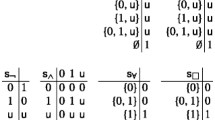Abstract
Timothy Williamson has argued that in the debate on modal ontology, the familiar distinction between actualism and possibilism should be replaced by a distinction between positions he calls contingentism and necessitism. He has also argued in favor of necessitism, using results on quantified modal logic with plurally interpreted second-order quantifiers showing that necessitists can draw distinctions contingentists cannot draw. Some of these results are similar to well-known results on the relative expressivity of quantified modal logics with so-called inner and outer quantifiers. The present paper deals with these issues in the context of quantified modal logics with generalized quantifiers. Its main aim is to establish two results for such a logic: Firstly, contingentists can draw the distinctions necessitists can draw if and only if the logic with inner quantifiers is at least as expressive as the logic with outer quantifiers, and necessitists can draw the distinctions contingentists can draw if and only if the logic with outer quantifiers is at least as expressive as the logic with inner quantifiers. Secondly, the former two items are the case if and only if all of the generalized quantifiers are first-order definable, and the latter two items are the case if and only if first-order logic with these generalized quantifiers relativizes.
Similar content being viewed by others
References
Areces, C., & ten Cate, B. (2007). Hybrid Logics. In P. Blackburn, J. van Benthem, F. Wolter (Eds.), Handbook of modal logic (pp. 821–868). Amsterdam: Elsevier.
Barwise, J., & Cooper, R. (1981). Generalized quantifiers and natural language. Linguistics and Philosophy, 4, 159–219.
Barwise, J., & Feferman, S. (1985). Model-theoretic logics. New York: Springer-Verlag.
Blackburn, P., M. de Rijke, Y. Venema (2001). Modal logic. Cambridge: Cambridge University Press.
Boolos, G. (1984). To be is to be the value of a variable (or to be some values of some variables). Journal of Philosophy, 81, 430–450.
Bricker, P. (1989). Quantified modal logic and the plural de re. Midwest Studies in Philosophy, 14, 372–394.
Correia, F. (2007). Modality, quantification, and many Vlach-operators. Journal of Philosophical Logic, 36, 473–488.
Fine, K. (1970). Propositional quantifiers in modal logic. Theoria, 36, 336–346.
Fine, K. (1977). Postscript to worlds, times and selves (with A. N. Prior). London: Duckworth. Reprinted in Fine, K. (2005). Modality and tense. Oxford: Clarendon Press; page numbers refer to reprint.
Fine, K. (2003). The problem of possibilia. In M.J. Loux, & D.W. Zimmerman (Eds.), The Oxford handbook of metaphysics (pp. 161–179). Oxford: Oxford University Press. Reprinted in Fine, K. (2005).Modality and tense. Oxford: Clarendon Press; page numbers refer to reprint.
Forbes, G. (1989). Languages of possibility. Oxford: Basil Blackwell.
Hazen, A. (1976). Expressive completeness in modal language. Journal of Philosophical Logic, 5, 25–46.
Hirsch, E. (2009). Ontology and alternative languages. In D.J. Chalmers, D. Manley, R. Wasserman (Eds.), Metametaphysics: new essays on the foundation of ontology (pp. 231–259). Oxford: Clarendon Press.
Hodes, H.T. (1984). On modal logics which enrich first-order S5. Journal of Philosophical Logic, 13, 423–454.
Hodges, W. (1997). A shorter model theory. Cambridge: Cambridge University Press.
Karp, C.R. (1965). Finite-quantifier equivalence. In J.W. Addison, L. Henkin, A. Tarski (Eds.), The theory of models: proceedings of the 1963 international symposium at Berkeley (pp. 407–412). Amsterdam: North-Holland Publishing Company.
Kripke, S.A. (1963). Semantical considerations on modal logic. Acta Philosophica Fennica, 16, 83–94.
Kripke, S.A. (1983). Review of Fine. Journal of Symbolic Logic, 48, 486–488.
Lewis, D. (2004). Tensed quantifiers. In D.W. Zimmerman (Ed.), Oxford studies in metaphysics (Vol. 1, pp. 3–14). Oxford: Oxford University Press.
Lindström, P. (1966). First order predicate logic with generalized quantifiers. Theoria, 32, 186–195.
Mostowski, A. (1957). On a generalization of quantifiers. Fundamenta Mathematicae, 44, 12–36.
Peters, S., & Westerståhl, D. (2006). Quantifiers in language and logic. Oxford: Oxford University Press.
Prior, A.N. (1967). Past, present, and future. Oxford: Clarendon Press.
Rescher, N. (1964). Plurality quantification. Journal of Symbolic Logic, 27, 373–374.
Sider, T. (2006). Quantifiers and temporal ontology. Mind, 115, 75–97.
van Benthem, J. (2010). Modal logic for open minds. Stanford: CSLI Publications.
Vlach, F. (1973). ‘Now’ and ‘then’: a formal study in the logic of tense anaphora’. Ph.D. thesis, University of California, Los Angeles.
Westerståhl, D. (2011). Generalized quantifiers. In E.N. Zalta (Ed.), Stanford encyclopedia of philosophy (Summer 2011 ed.).
Williamson, T. (2010). Necessitism, contingentism, and plural quantification. Mind, 119, 657–748.
Williamson, T. (2012). Modal logic as metaphysics (forthcoming). Oxford: Oxford University Press
Author information
Authors and Affiliations
Corresponding author
Rights and permissions
About this article
Cite this article
Fritz, P. Modal Ontology and Generalized Quantifiers. J Philos Logic 42, 643–678 (2013). https://doi.org/10.1007/s10992-012-9243-5
Received:
Accepted:
Published:
Issue Date:
DOI: https://doi.org/10.1007/s10992-012-9243-5



